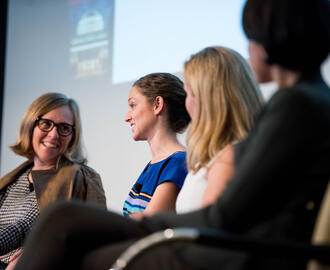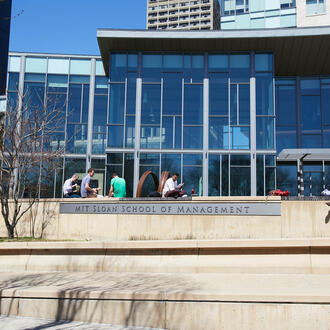Ray Reagans, Associate Dean for Diversity, Equity, and Inclusion
“If you look at early diversity programs, they were very much driven by shareholder perspectives,” says Alfred P. Sloan Professor of Management Ray Reagans. “The rationales for diversity were the value it could create and the problems that could arise from failing to address it effectively.” That perspective fundamentally changed in the wake of multiple societal phenomena—the #MeToo movement, increasing violence disproportionately affecting various ethnic groups, the resurgence of Black Lives Matter, and health inequities laid bare by the COVID-19 pandemic. “We are starting to hear more rationales that focus on justice. It’s the right thing to do in light of systemic inequality and oppression.”
At MIT Sloan, the April 2020 appointment of Reagans as Associate Dean for Diversity, Equity, and Inclusion and Fiona Murray (William Porter Professor of Entrepreneurship) as Associate Dean for Innovation and Inclusion signaled the school’s expanded commitment to improving DEI in an enduring way. Assistant Dean for DEI Bryan A. Thomas, Jr. joined the team in August 2021.
The creation of these new positions was a direct response to a 2019 statement by the MIT Sloan Student Senate in collaboration with MIT Sloan alumni. The groups expressed disappointment in the school’s slow progress toward diversifying the population across students, faculty, and staff. That year, the school’s graduating MBA class comprised only 8 percent Black students, 11 percent Latinx students, and 42 percent female students. Although those numbers were consistent with global MBA program averages, the amounts fell far short of the corresponding percentages of the U.S. population as a whole. “It was clear that our commitment to DEI needed to be more visible and robust,” says Reagans.
Three lenses on diversity
A key distinction of the MIT Sloan effort, as described by Reagans and Murray, is its strong organizational perspective based on 70 years of research at the school. “The study of organizational processes is not only in our curriculum, it’s in our DNA,” Reagans says. Specifically, MIT Sloan’s new DEI initiatives are guided by the “three lenses” approach laid out in the 1996 book Managing for the Future: Organizational Behavior and Processes coauthored by MIT Sloan professors Deborah Ancona, Thomas Kochan, D. Eleanor Westney, and John Van Maanen and UMass Boston professor Maureen A. Scully.
One lens—the strategic—focuses on an organization’s rational systems for achieving specific, well-defined goals. “Among the strategic issues we’re addressing is the talent pipeline for staff, faculty, and student recruitment,” says Reagans. “We’re revamping our interview process, for example, to reduce opportunities for biased decision making.”
A second lens—the political—highlights the social systems within an organization that define how competition for power, influence, and resources affect the actions of the corporate entity. “The political lens reveals the deficiencies of our traditional recruitment networks, which reflect our predominantly white male population,” Reagans explains. “One key initiative on this front is the hiring of specialized recruiting firms that enable us to tap into broader, more diverse networks.”
Toward a more inclusive culture
The third and most important lens, according to Reagans, is the cultural lens—the underlying beliefs and behaviors that people take for granted as part of the organizational routine. Because culture is passed on to new members of a community by its existing members almost without thinking, its inherent biases have the potential to undermine any efforts to change an entity’s strategic or political systems. “We must examine and redesign how we orient and welcome individuals to MIT Sloan, for example, and question our assumptions about the lived experience of our students, staff, and faculty. This is a starting point for recognizing our own unconscious biases and subjective beliefs.”
One outcome on this front is involving staff members in finding more constructive ways to talk about race and engage productively in difficult conversations. “We’re learning how to be actively, consciously inclusive as opposed to just being less biased or simply polite,” says Reagans. “This represents a shift from traditional approaches to DEI as training exercise—i.e., changing the way people think will change their actions. Our approach turns that on its head. Rather than thinking our way into a new way of acting, we are acting our way into a new way of thinking.”



